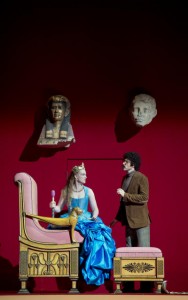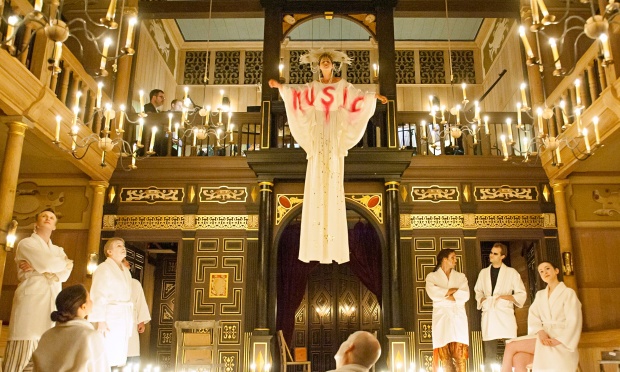One week, two operas
Dr Francesco Izzo (Senior Lecturer in Music) talks about recent opera productions:

I go to the opera frequently, but the past week has been an especially exciting one. On Sunday, 8 February at the Frankfurt Opera, I had the opportunity to attend one of the rare modern performances of Antonio Cesti’s L’Orontea—one of the most successful operas of the mid seventeenth century. And on Friday, 13 February I was at the Sam Wanamaker Playhouse in London, where the Shakespeare Globe and the Royal Opera co-produced the similarly rare L’Ormindo by Francesco Cavalli. In the latter, the Orchestra of the Early Opera Company featured the University of Southampton’s own Head of Early Music, renowned lute and theorbo player, Elizabeth Kenny.
 Indeed, seventeenth-century opera is undergoing a phase of resurgence, and it shouldn’t surprise that works by these and other hitherto neglected composers are finding their way to the stages of leading opera companies. What does surprise is the variety of approaches to their performance. Take the Frankfurt production of L’Orontea: the performance used an exciting new critical edition of Cesti’s score, prepared by Spanish musicologist Álvaro Torrente, and aimed to present the entire piece in the original language, with no cuts or alterations. The performance lasted well over three hours. L’Ormindo presented in London, conversely, was translated into English, and shortened by abbreviating or omitting repeats and other passages (even so, it added up to nearly three hours). In both instances, the houses were filled to capacity, and the audience was enthusiastic.
Indeed, seventeenth-century opera is undergoing a phase of resurgence, and it shouldn’t surprise that works by these and other hitherto neglected composers are finding their way to the stages of leading opera companies. What does surprise is the variety of approaches to their performance. Take the Frankfurt production of L’Orontea: the performance used an exciting new critical edition of Cesti’s score, prepared by Spanish musicologist Álvaro Torrente, and aimed to present the entire piece in the original language, with no cuts or alterations. The performance lasted well over three hours. L’Ormindo presented in London, conversely, was translated into English, and shortened by abbreviating or omitting repeats and other passages (even so, it added up to nearly three hours). In both instances, the houses were filled to capacity, and the audience was enthusiastic.
The different (sometimes declaredly opposing) philosophies are intriguing: on one hand, in Frankfurt, the performance endeavoured to deliver a ‘faithful’ rendition of L’Orontea as it was originally conceived, presenting the audience with the opportunity to hear all of its music. It is no easy endeavour, for operas at the time changed constantly, depending on casting and numerous other factors, and some aspects of the score of L’Orontea are puzzling. On the other hand, in London, the Royal Opera sought to bring L’Ormindo closer to a twenty-first century Anglophone audience by translating the text (thus, no surtitles were required) and reducing the length of the piece (we’ve all got trains to catch, don’t we?). The Royal Opera website stressed that this was an ‘innovative’ production.
In the presence of such vastly differing approaches, it is always tempting to take sides. ‘I want to hear the real thing’, or, ‘I want real entertainment value’. As a scholar and a teacher, I work intensively on opera, leading the critical edition of the works of Giuseppe Verdi and other editorial projects, and teaching modules on Italian opera and on Benjamin Britten. Indeed, I think a great deal about authorial intentions and whether and how they can or should be realised in performance. I find that the Frankfurt Opera made a brave decision with L’Orontea, giving the whole (long) score a chance. At the same time, I recognise that L’Ormindo came across as fresh and engaging (although there were times when musical numbers were truncated just as soon as one began to enjoy them).
What I’ve taken away from the twofold experience with L’Orontea and L”Ormindo in the past few days is a renewed perception of the multiple ways in which we, as scholars and performers, can bring early opera to our audiences, and of how enthusiastic and open-minded those audiences are. In my opera modules here at Southampton I always try to develop in our students an awareness of, and passion for opera as live experience, investigating the tension (and overlap) that exists between a text and its performance—and between authors and performers. In a way, it is the extraordinarily vast middle ground between the Frankfurt L’Orontea and the London L’Ormindo that we need to explore, looking for novel and exciting ways to bring opera to the public and to respect and enjoy it as art, as a creative endeavour, and as an endlessly engaging form of expression and source of entertainment. Singers, instrumentalists, and conductors at Southampton are in for some hard but very exciting work!

